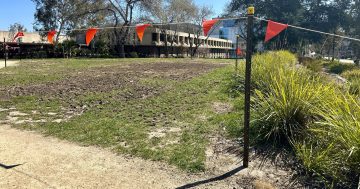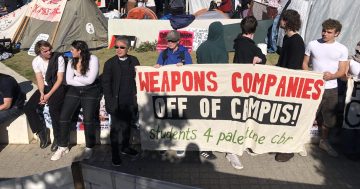
Protesters at the ANU Gaza Solidarity Encampment earlier this year called for a divestment from weapons. Photo: Supplied.
The Australian National University’s (ANU) Council has decided to stop investing in some weapons manufacturers, but student protesters don’t think the decision goes far enough.
On Tuesday (13 August), the council announced it had resolved that the University’s Long Term Investment Pool will not invest in controversial weapons manufacturers or civilian small arms manufacturers. However, not all are impressed.
“It will have a marginal impact on their investments and no impact whatsoever on their research partnerships,” Nick Reich from Students for Palestine said.
“Ultimately, it seems like they are just doing a PR manoeuvre.”
Student protesters have been calling for weapons divestment this year. Freedom of Information documents requested by the students reportedly showed that the ANU had held investments in Lockheed Martin, BAE Systems, Northrop Grumman, Boeing and Saab, which were valued at more than $1 million.
Mr Reich, whose group has been involved in the protests, said the companies included in Tuesday’s announcement will be the ones that produce weapons banned by international law, while those like Lockheed Martin don’t produce those sorts of weapons.
“It’s fairly clear that a lot of the weapons companies we’ve been campaigning against will not be included in this announcement,” he said.
He said the companies Students for Palestine has been campaigning against include “the companies that are supplying the Israeli Defence Force” and “ones that stand to make a profit off the genocide that is being carried out in Gaza”.
ANU Students’ Association president Phoenix O’Neill welcomed the changes to the Socially Responsible Policy to exclude controversial and civilian weapons as a first step.
“However, we remain committed to calling for the ANU to divest from all companies that are connected with provisions of military goods and services,” they said.
“This change is proof of the power of students’ voices. We encourage students to continue to make their voices heard.”

ANU Students’ Association president Phoenix O’Neill welcomed the changes to the Socially Responsible Policy. Photo: Supplied.
An ANU spokesperson told Region that controversial weapons manufacturers will be determined using Australian Government policy, as Australia was a signatory to conventions that prohibit the ownership and use of such weapons.
“The controversial weapons to be included in the negative screen are anti-personnel mines, cluster munitions, chemical weapons, biological weapons and nuclear weapons outside of the NPT [the Treaty on the Non-Proliferation of Nuclear Weapons],” they said.
“Production of these controversial weapons is an automatic exclusion.
“This is a principles-based decision. The university has decided it will not invest in companies that derive revenue from those activities.”
The ANU spokesperson also said all research was covered by its policy on academic freedom.
“Under this policy, ANU researchers are able to undertake research with partners as they see fit, subject to relevant checks and balances. These include ethics approval, national security and foreign interference assessments, and modern slavery considerations, among others,” they said.
The ANU first adopted a Socially Responsible Investment Policy in 2013, which meant it aimed to take a socially responsible approach to decision-making on investments.
It agreed to update the policy earlier this year and the review process attracted almost 900 submissions from staff, students and alums.
The ANU said Tuesday’s announcement added to existing investment screens relating to coal, gambling, pornography and tobacco.

ANU Vice-Chancellor Professor Genevieve Bell says community expectations have changed. Photo: Andrew Mears/ANU.
“The ANU Socially Responsible Investment Policy was sector-leading when it was introduced in 2013, but community expectations around what socially responsible investment means are evolving and expanding,” ANU Vice-Chancellor Professor Genevieve Bell said on Tuesday.
“Our university community has recently drawn attention to investment in companies that derive revenue from arms manufacture and sales. We have listened to that feedback from our community.
“We will also seek to explore further the positive social benefits that can be pursued through investment activity, particularly in relation to gender equality, First Nations-led companies and companies that manage modern slavery risks.”
The ANU spokesperson said the university will continue to review its policy settings to ensure investment decisions are aligned with its values.
“The implementation of these changes will take some time as the university will issue instructions to our external investment managers, who will then have 90 days to implement the required changes,” they said.




















